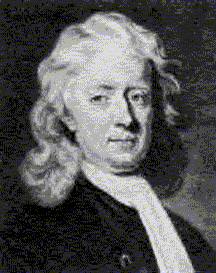
1642-1727

1642-1727
Sir Issac Newton was born on December 25, 1642. He studied at Cambridge University and became a professor there, therefore remaining there from 1661-1696. Newton strongly influenced theoretical astronomy. He defined the laws of motion and universal gravitation, and then used them to correctly predict the motions of stars and planets around the sun. Newton constructed the first reflecting telescope. Newton left science with a unified system of laws, that could be applied to a large range of physical phenomena, and that could be used to make exact predications. Newton published his findings in two books, namely "Principia" and "Optics." He had four rules of scientific method:
1. We are to admit no more causes of natural things such
as are both true and sufficient to explain their appearances.
2. The same natural effects must be assigned to the same
causes.
3. Qualities of bodies are to be esteemed as universal.
4. Propositions deduced from observation of phenomena
should be viewed as accurate until other phenomena contradict them.

Literature About Newton
![]() Newton--Bentley
Correspondence
Newton--Bentley
Correspondence
![]() Newton
on the Bible
Newton
on the Bible